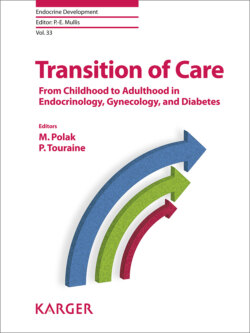Читать книгу Transition of Care - Группа авторов - Страница 13
На сайте Литреса книга снята с продажи.
Challenges Coming from the Pediatrician
ОглавлениеTransition may be a difficult process for the pediatrician who has been engaged in taking care for a long time, sometimes from birth, of the child and family. Therefore transition may be seen as breaking strong links. This rupture may be even more difficult when some problems are not solved, such as cognitive disabilities, end of growth, or puberty. In relation to the latter, for the pediatric endocrinologist, transition can be defined from physiological changes that occur during the period from the end of puberty to the attainment of an adult phenotype and need to be achieved to implement transition. The start of transition may be considered to be when patients reach Tanner stage 5, reported to occur at a mean age of 14.7 ± 2.2 years in boys or 14.0 ± 2.4 years in girls [18]. It can also be considered to be when patients have reached their adult height, at the mean age of 16.8 ± 2.2 years in boys and 15.2 ± 2.0 years in girls [18].
The pediatrician will also have to overcome several fears: the feeling that the endocrinologist for adults may not master specific problems of the child’s condition; her/his scientific interest for the condition of the child. She/he may be willing to study the natural history of the condition as well as determine the health status of the young adults to be able to perform an autoevaluation of her/his own practice. Those fears will have to be overcome in order to be able to work in good harmony with the endocrinologist for adult patients and be able to design together studies on long-term follow-up.
